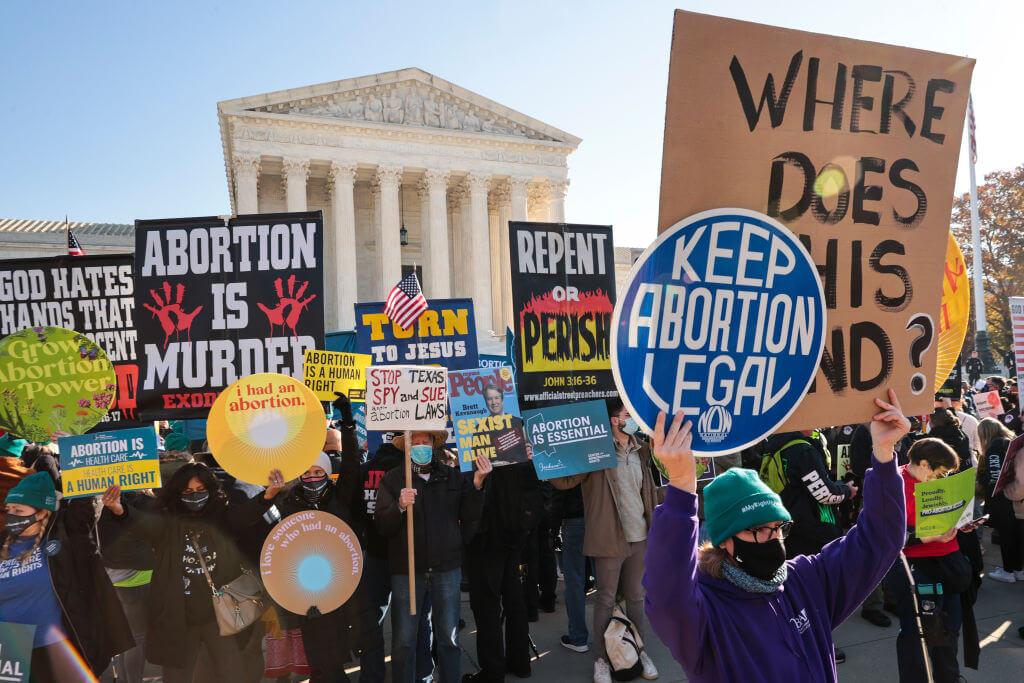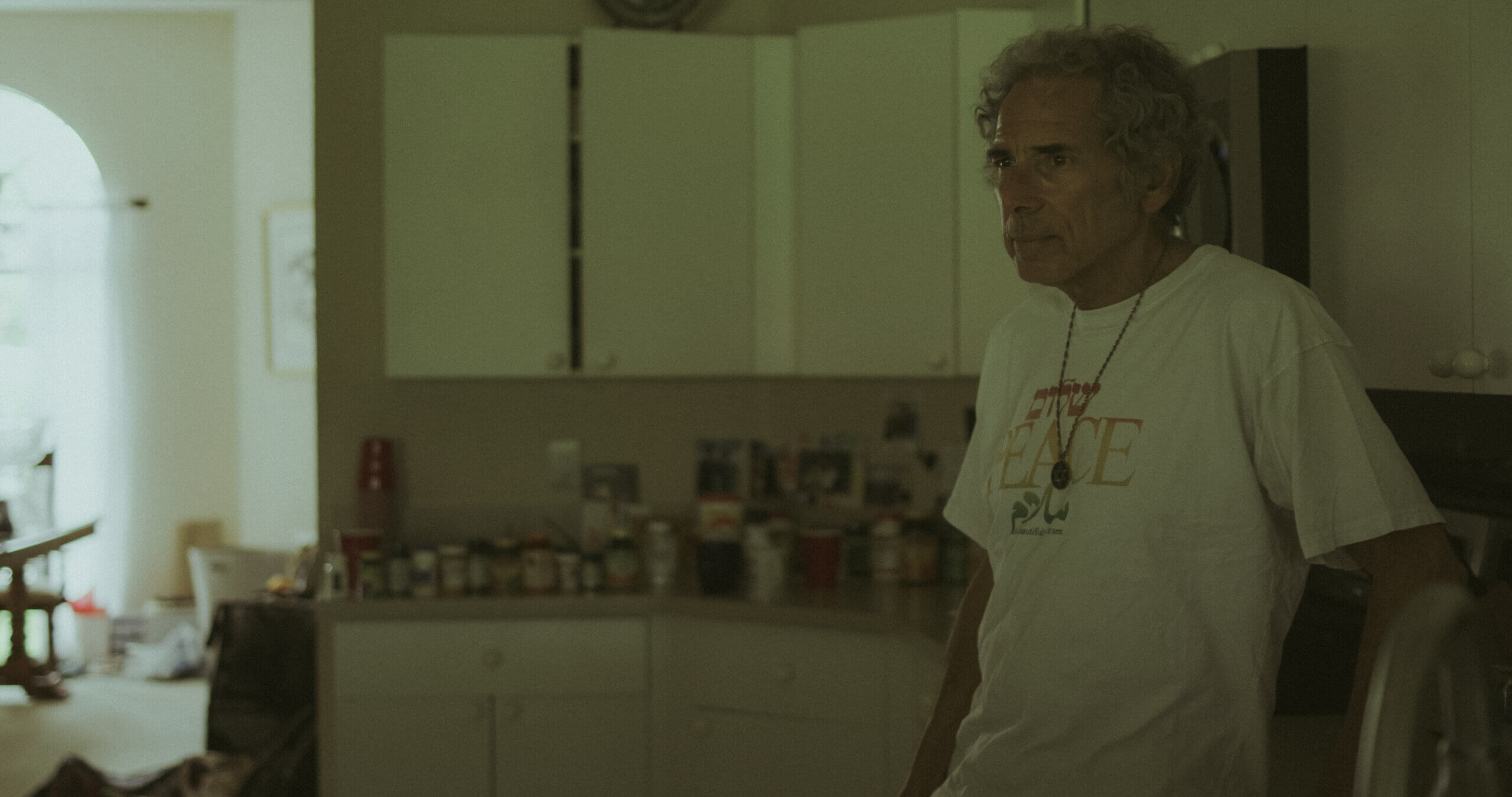Why are Jews suing to block abortion bans?
Paula Eiselt’s documentary ‘Under G-d’ argues that religious freedom requires pro-choice public policy

Demonstrators rallied for and against abortion access in 2021 as the Supreme Court heard arguments in the Dobbs v. Jackson case, which would ultimately strike down a constitutional right to abortion. Photo by Chip Somodevilla/Getty Images
When describing her abortion to a crew of documentary filmmakers, Elly Cohen is weary, depressed and almost — but not quite — resigned. A Jewish mother living in Indiana, she had learned that her fetus suffered a rare chromosomal disorder incompatible with life and decided to terminate her pregnancy rather than carrying it to term.
That was before the Indiana legislature passed a near-total abortion ban in the summer of 2022. While the ban has yet to go into effect, such choices could soon become impossible. Cohen and her husband want to conceive again and give their toddler a younger sibling. But in the post-Roe world, it’s simply too scary to be pregnant.
Cohen tells her story in the opening scene from Under G-d, a short film directed by Paula Eiselt tackling one of the most hotly debated issues of our time: abortion. A year after the Supreme Court overturned 50 years of precedent in Dobbs v. Jackson and declared that a constitutional right to abortion does not exist, Americans are accustomed to invocations of religious freedom from anti-choice conservatives who claim that the medical procedure violates their beliefs. Eiselt doesn’t attempt to refute such claims. Instead, she asserts that banning abortion violates the religious freedoms of those who practice many non-Christian faiths — especially Judaism.
Many opponents of abortion ground their arguments in religious, usually Christian, beliefs. Abortion rights advocates have often approached the issue from a secular vantage point, contending that abortion restrictions informed by such beliefs violate the separation of church and state. Eiselt complicates that dynamic by exploring the many religions, namely Judaism, Buddhism and Islam, in which life is considered to begin at birth and terminating a pregnancy can be an acceptable or even prescribed option. The teachings of these religions don’t necessarily affirm a “right to choose” — neither Buddhism nor Islam have a clear theological consensus on abortion — but they generally allow for more nuance and flexibility than the abortion bans taking root in Republican-dominated states. Although there’s plenty of debate about the circumstances under which Jewish law permits abortion, the rights of the mother usually take precedence over those of the fetus. And while many observant Christians oppose abortion, Orthodox Jewish women have sought the procedure with the approval of their rabbis.
So while abortion bans might reflect the religious beliefs of some conservative Christians, they interfere with the rights and practices of other religious groups, ultimately breaching their First Amendment rights.
Under G-d, which debuted at the 2023 Sundance Film Festival and is now airing through the PBS documentary series POV, focuses on subjects in several states who have been personally affected by abortion bans passed in the wake of the Dobbs decision or are working to overturn them. In addition to Cohen, the film introduces viewers to the Florida-based rabbi and lawyer Barry Silver. Sporting curly gray hair, a T-shirt printed with the word “Peace,” and a large Star of David dangling from a chain, Silver very much evokes a hippie from a late-’60s flick as he blasts Florida’s 15-week abortion ban. Yet he’s very much a man of his own moment: An abortion rights activist, Silver filed a lawsuit on behalf of his synagogue against the state’s ban.
Silver’s actions have paved the way for like-minded suits in several states, which argue that abortion bans violate freedoms of religion and must therefore be repealed. In at least three suits, the plaintiffs explicitly identify themselves as Jews. Cohen, the Jewish mother who feared getting pregnant under Indiana’s abortion ban, is a member of Hoosier Jews for Choice, an organization that has filed one such suit against the state.
The lawsuit has also made Silver a somewhat prominent figure in his community: The Palm Beach County chapter of the National Organization for Women voted him “feminist of the year” in 2022.
While Under G-d emphasizes that many religions permit abortion, the film’s message is filtered through a specifically Jewish lens. Just consider the spelling of “God” in its title, which references complex ancient Jewish laws. The film also draws on the long history of Jewish abortion rights activism, from the start of the birth control movement to the heyday of the Jane Collective, a clandestine abortion provider in Chicago. A Rutgers professor cited in the film noted that today, 80% of American Jews support abortion rights.
Still, the documentary highlights Silver’s comrades across a religious and cultural spectrum. Floridian Buddhist leader Maya Malay has joined his lawsuit against the abortion ban; and Marci Hamilton, a Presbyterian Constitutional law scholar, represents clergy in a number of Florida suits similar to Silver’s.

Under G-d employs a frankly pedestrian structure, and relies too much on talking heads and archival footage. Yet I was moved by the argument made by various authorities in Jewish law that flexibility is central to the religion. It’s fundamentally Jewish, said Rabbi Jeremy Weider of New York’s Yeshiva University, to reconsider and revise laws and interpretations of faith.
“Jewish law is a dynamic process,” he said.
One scene in the film has a special resonance beyond the abortion debate. Bringing the filmmakers to her home, Cohen explains that she does not hang her mezuzah on the front door but rather inside, so that it remains invisible to anyone who might target the family for antisemitic harassment. A recent uptick in antisemitism has created a sense of fear for Cohen — and, the film suggests, all American Jews, whether or not they hang a mezuzah.
The problem of American antisemitism may seem completely distinct from the wave of abortion bans sweeping the country since the Dobbs decision. Yet the film suggests that there is an implicit link between a government that prioritizes the claims of one religion and individuals who feel empowered to target minorities. Cohen’s heightened discomfort as a Jew, in all areas of her life, serves to connect the two.
The film Under G-d can be seen July 25 on PBS.
Correction: An earlier version of this story gave the wrong name for the organization that recognized Silver. It is the National Organization for Women, not the National Organization of Women.























